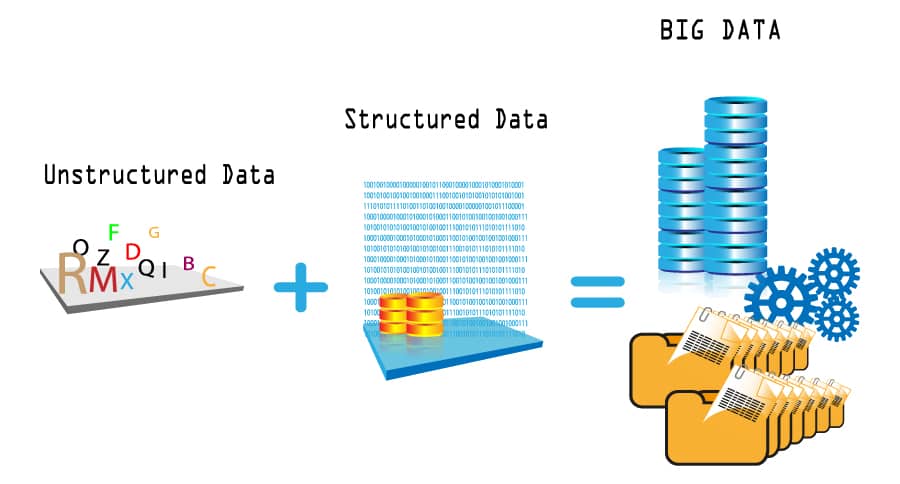Let's Talk !
Big data in healthcare refers to massive quantities of structured and unstructured data collected from EHRs, EPRs, and clinical decision support systems. The collected information is organized and managed to be available for healthcare professionals to leverage in order make strategic business decisions, improve outcomes, all while reducing cost.
Here's where we're going if you want to jump ahead:
Big data has infiltrated cross-industry, forcing many verticals to adopt technology that supports greater analytics capabilities. The healthcare industry is no exception to this trend. Market research has shown the global big data in healthcare market is expected to reach $34.27 billion by 2022 at a CAGR of 22.07% during the forecast period.
Why has big data become such a buzzword among top industries? Let's revisit big data and find out exactly how it is impacting the healthcare industry.
The healthcare landscape is saturated with data, processing over 30 billion healthcare transactions a year. Big data analytics in healthcare has the potential to evolve into a promising field, providing resolutions to some of the most common industry drawbacks like cost inefficiencies and medication errors.
The healthcare industry produces zettabytes of data taken from EHRs, medical imaging, medical devices, and so much more that big data is able to aggregate, organize, and manage to improve the entire healthcare ecosystem. In essence, big data is ideal in the healthcare industry because of the robust amount of data it generates delivering use cases that can be used to provide changes to medicine, technology, and finance along with other benefits to drive productivity.
The advantages of implementing big data have undoubtedly caught the attention of the healthcare industry as they try to find more effective business methods to drive productivity and the quality of service. Though the healthcare industry stands to benefit from big data, there are some challenges to overcome.
Before we dive in, let's revisit the basics.

Big data refers to large sets of complex, raw data that can provide profound insight when fed through an intelligent analytics software. Unfortunately, the majority of technology has not yet been scaled to the magnitude of data we now have access to, and traditional data-processing software is incapable of navigating big data. Big data requires advanced technologies to capture, store, and distribute the information.
Data aggregation is nothing new. For years, we have collected and analyzed data to gain additional insight, but it was not until early 2000 that Doug Laney first coined the definition we now know as the "three Vs" of big data.
Volume- refers to the amount of data
Velocity-refers to the speed of data processing
Variety- refers to the number of types of data
The significance of big data is not because of the amount of data it contains but what can be done with it. With proper analysis of big data, industry leaders have been able to reduce cost, time, and have initiated the development of new products.
Now, let's explore the benefits and challenges of introducing big data into the healthcare industry.

The healthcare industry stands to gain tremendously by digitizing, combining and effectively applying big data. Through big data, healthcare organizations can create holistic, personalized, comprehensive patient profiles and detect diseases at much earlier stages to be treated more effectively.
Information, such as individual and population health, becomes readily available to healthcare providers to predict health outcomes and prepare preventative care accordingly. Healthcare organizations can also expect to boost security, as well, by detecting healthcare fraud more easily and effectively.
Data integration not only benefits healthcare providers, it stands to drastically improve the quality of service patients receive also. Mobile health applications such as telehealth and wearables like Fit Bit, will also grow and provide consumers with healthcare analytics, services and information instantly.
Though the benefits and future of big data in healthcare appear great some structural obstacles lie ahead for big data and healthcare. The two main roadblocks preventing the use of big data in healthcare are the technical skill required and being able to ensure compliance with all security measures around it.
Due to the complex nature of the files, big data requires a specialized skill set. Hospital IT experts are that are familiar with SQL programming and traditional databases are not equipped for the learning curve, hospitals will need to enlist the help of data scientist to manipulate information within a big data environment.
Security is another major roadblock for big data and healthcare. Big data storage is becoming notorious for attracting hackers or advanced persistent threats (APTs). Though most organizations are secure with their security measures policies such as HIPAA compliance must be protected.
Big data analytics has the potential to improve medicine, technology, and finance in the healthcare industry and we will see more healthcare organizations adopt it as it offers more benefits to the industry.
Consumers can expect better quality of care in and out of healthcare facility and healthcare providers can compile comprehensive patient profiles increasing customer loyalty. Big data in healthcare deems to have great potential to steer the industry in a more efficient and cost-efficient future.
Big Data provides the opportunity to take files that was once collected and archived to produce viable solutions to improve the healthcare infrastructure. Chetu leverages big data in healthcare software to institute technology that will streamline and improve the productivity of any size healthcare organization.
Disclaimer:
Chetu does not affect the opinion of this article. Any mention of a specific software, company or individual does not constitute an endorsement from either party unless otherwise specified. This blog should not be construed as legal advice.
Founded in 2000, Chetu is a global provider of custom software development solutions and support services. Chetu's specialized technology and industry experts serve startups, SMBs, and Fortune 500 companies with an unparalleled software delivery model suited to the needs of the client. Chetu's one-stop-shop model spans the entire software technology spectrum. Headquartered in Plantation, Florida, Chetu has fourteen locations throughout the U.S. and abroad.
Privacy Policy | Legal Policy | Careers | Sitemap | Referral | Contact Us
Copyright © 2000-2024 Chetu Inc. All Rights Reserved.
